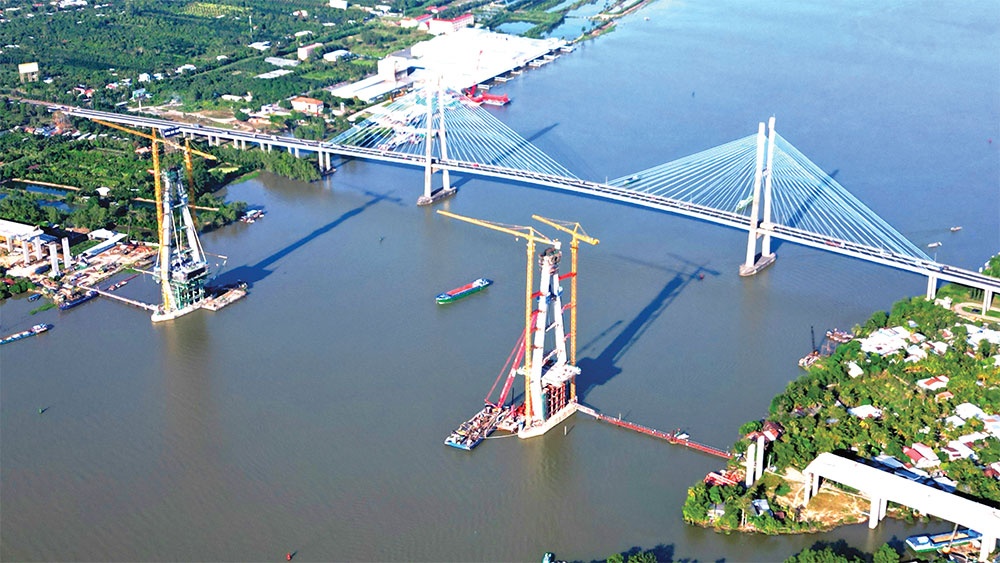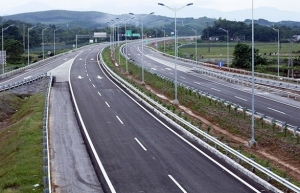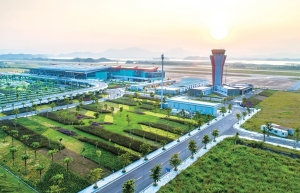Vow made to bridge PPP investment gaps
Deputy Prime Minister Tran Hong Ha over a week ago tasked ministries, sectors, and localities nationwide to carry out feasible solutions to remove difficulties for projects implemented under the public-private partnership (PPP) format. The move is aimed to reform the way the country is trying to attract private investments into PPP projects in line with international practices.
Ha assigned the Ministry of Planning and Investment to coordinate with relevant ministries in assessing the deployment of the Law on Public-Private Partnership Investment promulgated in 2020, and reviewing and identifying all impediments during the implementation process of relevant documents on guiding the implementation of this law. Therefrom, they must propose amendments and supplements, and then report to the prime minister in Q2.
 |
| Vow made to bridge PPP investment gaps |
Ministries and localities are required to propose solutions to attract international financial funds and foreign capital sources to partake in PPP projects in Vietnam, and also report to the prime minister. Especially, they are ordered to study sources of payment capital for enterprises implementing the PPP projects if the revenue sharing mechanism is applied and contracts are terminated ahead of time. This job has to be reported to the prime minister in the third quarter of the year.
The government has assigned the Ministry of Finance to combine with relevant ministries to review and identify difficulties in the implementation of relevant legal documents on financial management of PPP projects and on the use of public assets to pay for investors with projects constructed under the form of build-operate contracts.
After receiving reports from ministries and localities, the government is expected to enact a new document on PPP investment, making it more favourable for private investors to engage in projects in the country.
At the Vietnam Business Forum on March 19, its Infrastructure Working Group (IWG) underlined the need for the formulation of sector-specific policies to enable long-term and large-scale energy and infrastructure investment.
“The law on PPP investment is not working - no project has been implemented and financed on a project non-recourse basis under this law. A thorough review and amendment of the law is required urgently,” the IWG stated in a proposal sent to the government. “Guidelines and best practice negotiation should be open for project contracts in each specific sector, which should be devised with the goal being a bankable solution for build-operate-transfer development.”
When it comes to tendering, the IWG suggested that in addition to open bidding process which has not been successful under the PPP law and the Law on Investment, “legal frameworks and policies should be allowed for competitive bidding process on selection of investors for PPP and non-PPP projects based on investors’ capabilities.”
Pan-Asia law firm Dezan Shira & Associates has also highlighted some of the challenges on related funding in Vietnam.
“Firstly, the disbursement of state funds can be difficult, especially given that overlapping regulations in some legal documents can deter special-purpose entities from receiving investment capital from the government,” said the firm. “Secondly, dispute settlement may be difficult for given that the process usually goes through Vietnamese courts instead of international arbitration centres. Last, unclear administrative procedures need to be completed before investment and operation. However, the government has already enacted a number of measures to improve the business environment, which is an encouraging sign.”
In Vietnam, PPP projects currently often refer to infrastructure development such as roads, expressways, bridges, water, electricity, and healthcare, among others. Nguyen Duc Tiep from law firm Minh Tiep in Hanoi said that it would be difficult for the government to attract private investment in such projects.
“For example, the law currently does not clarify the rights of private investors to the facilities in PPP projects. The lack of a sharp definition is making investors uncertain about their ownership of the facilities, putting them off,” Tiep said. “What is more, there is no right stipulated for private investors to operate the facilities for profits once they pour their money into PPP-based projects.”
According to Fitch Solutions, the Law on PPP Investment is set to up infrastructure development in Vietnam. The firm forecasts construction growth to be 6.8 per cent a year on average from 2021 to 2029.
According to experts from the Asian Development Bank (ADB), despite significant gains in the last decade, Vietnam’s infrastructure lags regional peers, such as Indonesia, Malaysia, and Thailand.
The spending required to close the infrastructure gap is significant. Between 2021 and 2030, Vietnam will need an estimated $237 billion for infrastructure to achieve the UN’s Sustainable Development Goals. To fund this investment, the Global Infrastructure Hub based in Australia estimates that Vietnam will need to mobilise an estimated $49 billion above what it has historically spent.
The government already shoulders 90 per cent of infrastructure spending, and public investment as a proportion of GDP at 8 per cent is relatively high. Therefore, Vietnam cannot afford a large increase in its infrastructure budget. “Thus, PPPs can help to address the shortfall,” said Don Lambert, principal private sector development specialist at the ADB.
 | Ninh Binh-Nam Dinh-Thai Binh Expressway to be built under PPP The government has given the green light for the development of Ninh Binh-Nam Dinh-Thai Binh Expressway under the public-private partnership format. |
 | Lai Chau Airport may be invested in with PPP The Ministry of Transport (MoT) has just sent an official dispatch to the prime minister and Lai Chau People's Committee on the investment in Lai Chau Airport, which is to be constructed under the public-private partnership (PPP) format. |
 | PPPs driving small airport investment Vietnam wants to increase investment in domestic airports and establish better infrastructure, but capital will only increase when the institutional conditions are further improved. |
 | PPP model found suitable for small airports in remote areas As public-private partnerships are proving efficient in more countries worldwide, Vietnam is being urged to promote the model in its future airport development plan to encourage private investment inflows. |
What the stars mean:
★ Poor ★ ★ Promising ★★★ Good ★★★★ Very good ★★★★★ Exceptional
Related Contents
Latest News
More News
- Vietnam, New Zealand seek level-up in ties (February 19, 2026 | 18:06)
- Untapped potential in relations with Indonesia (February 19, 2026 | 17:56)
- German strengths match Vietnamese aspirations (February 19, 2026 | 17:40)
- Kim Long Motor and AOJ Suzhou enter strategic partnership (February 16, 2026 | 13:27)
- Haiphong welcomes long-term Euro investment (February 16, 2026 | 11:31)
- VIFC in Ho Chi Minh City officially launches (February 12, 2026 | 09:00)
- Norfund invests $4 million in Vietnam plastics recycling (February 11, 2026 | 11:51)
- Marico buys 75 per cent of Vietnam skincare startup Skinetiq (February 10, 2026 | 14:44)
- SCIC general director meets with Oman Investment Authority (February 10, 2026 | 14:14)
- G42 and Vietnamese consortium to build national AI infrastructure (February 09, 2026 | 17:32)

 Tag:
Tag:




















 Mobile Version
Mobile Version